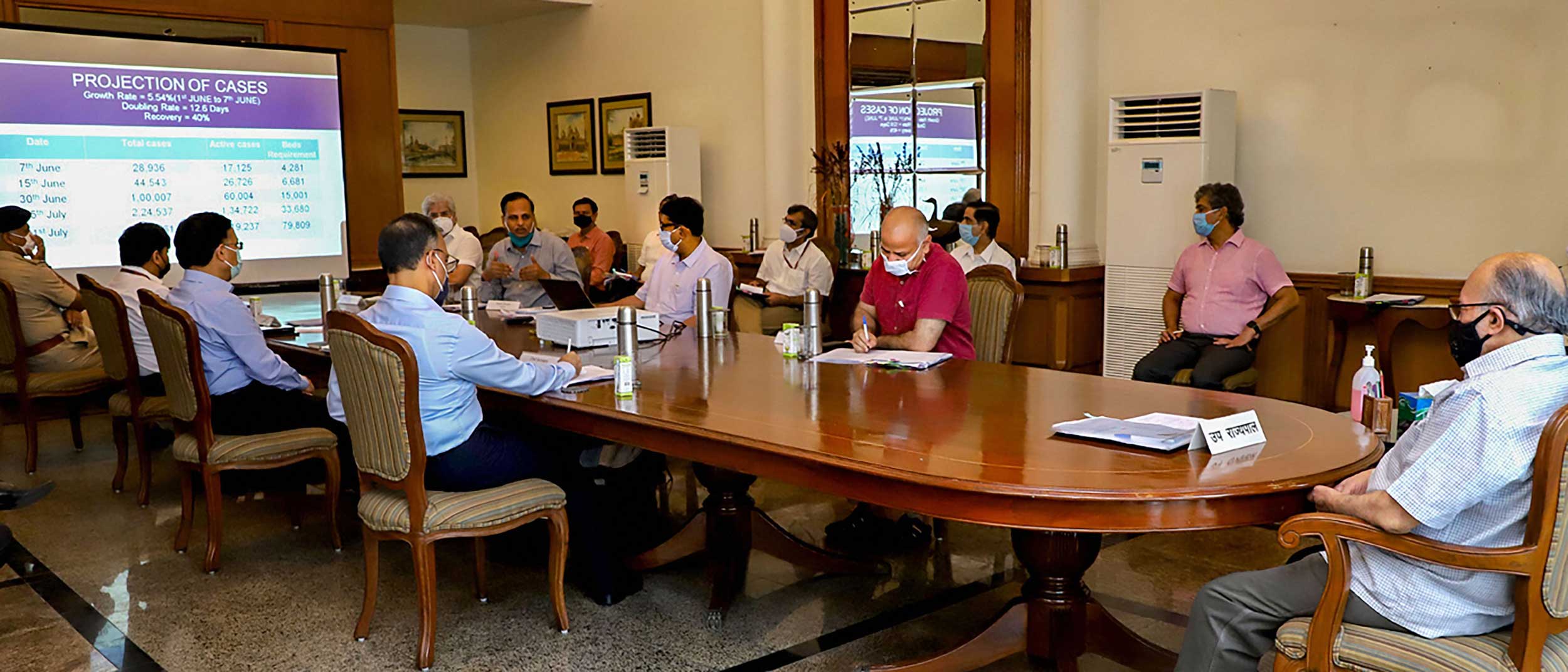The Delhi government on Tuesday nudged the Centre to declare community transmission of the coronavirus in the city and suggested the capital might by July 31 witness 5.5 lakh Covid-19 cases and need 80,000 hospital beds for them.
Deputy chief minister Manish Sisodia said that at a meeting of the Delhi Disaster Management Authority (DDMA), chaired by lieutenant governor Anil Baijal, everyone had agreed with his government’s assessment of the likely rate of the coronavirus’s spread over the next two months.
The assessment is that at the current rate of cases doubling in 12.6 days, “by June 15, there’ll be 44,000 Covid-19 cases and 6,600 beds will be required”, Sisodia said.
“By June 30, we’ll reach one lakh cases and 15,000 beds will be required. By July 15, there’ll be 2.25 lakh cases and 33,000 beds will be required. By July 31, 5.5 lakh cases are expected and 80,000 beds will be required.”
Among those attending Tuesday’s meeting was Indian Council for Medical Research (ICMR) director-general Balram Bhargava.
During the day, Baijal’s office said that Delhi healthy secretary Vikram Dev Dutt had clarified there were “8,821 hospital beds, 582 ICU beds, 468 ventilator beds and 3,590 oxygenated supported (sic) beds in dedicated Covid hospitals”.
Almost 3,000 more Covid-19 beds would be available by June 20, with several four-star and five-star hotels linked to hospitals and offering beds at Rs 10,000 a day.
Besides, Delhi’s six main stadiums have been recommended for conversion to makeshift hospitals.
The “community” transmission nudge came from Delhi health minister Satyendar Jain.
“We say it’s community spread when people don’t know how they got the infection. In 50 per cent of the cases in Delhi, the source of infection is not known,” he told reporters.
“On behalf of the state government, we can only say that there is a significant spread but only the central government can say if it is community spread.”
Once community transmission has been declared, he said, the focus would shift from tracing the contacts of patients and trying to contain the virus to saving the lives of the patients.
Sisodia said that at the DDMA meeting, “central government officials said it (community spread) had not happened yet and there was no need to discuss this matter”.
Former ICMR director-general N.K. Ganguly told The Telegraph there were currently no scientific data to ascertain whether community transmission was happening in Delhi.
“But people who came from outside were quarantined, travel was suspended, patients and contacts were quarantined, and yet cases continue to increase in Delhi and Mumbai. This indicates that the spread is happening in the community,” he said.
“In community transmission, we have to come up with a mechanism for people to self-quarantine without losing their livelihood and continue to wear masks, maintain social distancing — but most importantly, to remove stigma so that people can fearlessly report themselves.”
Sisodia tried to portray Baijal as clueless about the scale of the Covid-19 challenge a day after the lieutenant governor had nixed a state government order reserving its hospitals and most private hospitals in Delhi for city residents.
“We asked the hon’ble LG (at Tuesday’s meeting) about his predictions about how many cases might increase in the coming days and how many cases might come from outside but he had no answers,” Sisodia told reporters.
“We also asked that if people from outside come to Delhi, how many beds we might need and he had no answer to that as well.”
Sisodia had attended the meeting on behalf of an ailing chief minister Arvind Kejriwal who, however, tested negative for the coronavirus on Tuesday.
In a statement at night, Baijal’s office responded to Sisodia’s charges saying the LG was fully aware of the need to ramp up the medical infrastructure and, therefore, the meeting had discussed converting stadiums into hospitals.
“It is unfortunate that any responsible government should attempt to discriminate amongst patients on grounds of residence,” it said.
“Rather than discriminating between the patients the goal of the government should be to plan and prepare for adequate infrastructure. We are all Indians and Delhi belongs to all!”
On Tuesday, Baijal also chaired a meeting of all the recognised parties in Delhi. There, the Congress demanded a grant of Rs 10,000 for each Covid-19 patient.
Congress leader Ajay Maken has approached the National Human Rights Commission against the Delhi government’s alleged failure to manage the crisis.
Maken has quoted economic survey data that show the capital has 57,194 hospital beds. Therefore, there is no need to turn any patients away, he has argued, claiming the occupancy rate is still between 7 and 12 per cent.
The fatality rate in the capital is 2.92 per cent, higher than the national average of 2.81 per cent, and its testing rate of 13,543 per million easily trumps the national average of 3,531.
On Monday, the Covid-19 death count in Delhi was 874 and the number of active patients almost 30,000.











